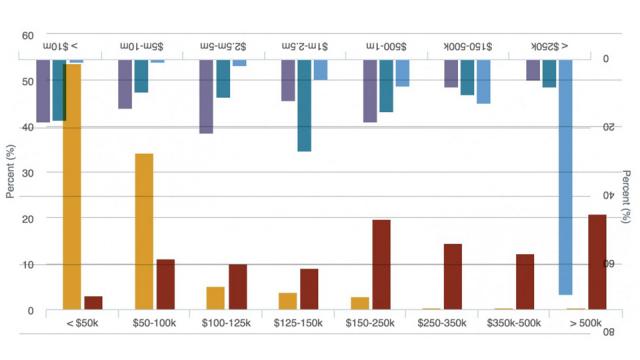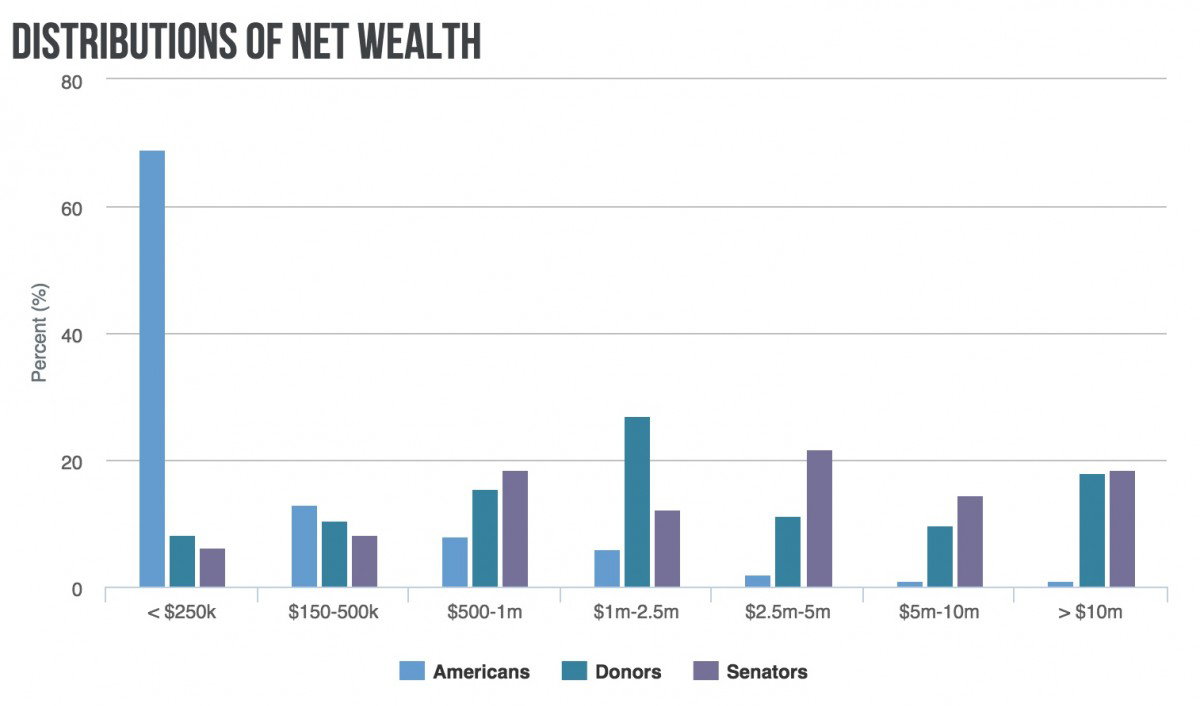
Two new studies by political scientists offer compelling evidence that the rich use their wealth to control the political system and that the U.S. is a democratic republic in name only.
In a study of Senate voting patterns, Michael Jay Barber found that “senators’ preferences reflect the preferences of the average donor better than any other group.” In a similar study of the House of Representatives, Jesse H. Rhodes and Brian F. Schaffner found that, “millionaires receive about twice as much representation when they comprise about 5 percent of the district’s population than the poorest wealth group does when it makes up 50 percent of the district.” In fact, the increasing influence of the rich over Congress is the leading driver of polarization in modern politics, with the rich using the political system to entrench wealth by pushing for tax breaks and blocking redistributive policies.
At the turn of the decade, political scientists Larry Bartels, Jacob Hacker and Martin Gilens wrote several incredibly influential important books arguing, persuasively, that the preferences of the rich were better represented in Congress than the poor. After the books were published, there was a flurry of research arguing that they had overstated their case.
Critics alleged two key defects in Bartels’ and Gilens’ arguments. First, because polling data on the super-wealthy were sparse, it was difficult to prove that there were large differences in opinion. Political scientists often rely on composite measures of policy liberalism, but since the poor tend to be more economically liberal but socially conservative, the differences between the poor and moderately rich can often be obscured. Second, there was no way to show that influence of the wealthy was caused directly by the influence of money. It might well be that the rich are simply opinion leaders or are more likely to vote.
Recent research offers compelling answers to these criticisms. The new evidence adds credence to the Bartels-Gilens-Hacker view that money is corrupting American politics. By using a massive database of ideology that includes the super wealthy, Schaffner and Rhodes found that “members of Congress are much more responsive to the wealthy than to their poor constituents.” However, this difference is not equal between both parties; rather, Democrats are far more responsive to the poor than Republicans. (This is not surprising; other research supports this claim.) They find that both parties strongly favor the upper-middle class, those with $100,000 to $300,000 in wealth. But Republicans are not only more responsive to the rich, but particularly to rich donors. Schaffner and Rhodes argue that, “campaign donations, but not voter registration or participation in primary or general election, may help explain the disproportionate influence of the wealthy among Republican representatives.”
Barber’s study is the first to directly examine the policy preferences of the donor class. Barber sent 20,500 letters to people who contributed to 22 Senate elections in 2012 and asked about various policy questions. This allowed Barber to examine the differences in representation between donors and non-donors. His finding: Donors’ preferences tend to be far better represented than non-donors’. The chart below measures the ideological differences between various groups, with 0 indicating a perfect fit. The data show that Senators are almost perfectly aligned with their donors, but rather distant from voters.
In fact, politicians are almost perfectly aligned with donors, but less aligned with partisans (people who voted for the Senator and share party affiliation), supporters (people who voted for the Senator) and voters in general. He Barber also finds that donors tend to be far more extreme in their views (see chart below). For instance, while about sixty percent of non-donor Republicans oppose the Affordable Care Act, opposition among donors is “almost unanimous.” Barber also notes that donors tend to be far more extreme than non-donors (see chart). (This is supported by other studies).
Such data could explain the rising polarization of Congress, as politicians increasingly respond to their donors, rather than to voters. Political scientists Walter J. Stone and Elizabeth N. Simas have found that challengers raise more money when they take extreme positions, which helps explain why incumbent representatives tend to be more partisan than departing representatives. It certainly explains the intransigence of the last two Congresses: Republicans, who are responding to their rich donor base, are incentivized to oppose any action, particularly those supporting Obama, lest they lose funding. Since Senators have to raise approximately $3,300 a day every year for six years to remain viable, they will inevitably have to succumb to the power of money if they wish to be reelected.
This research raises the disturbing thought that our political system is no longer representative. As Barber notes, about half of all donors are from out of state, meaning that politicians are no longer responsive to their voters (though they are slightly more during election years). Given that only .22 percent of Americans made a donation of more than $200 (the level Barber studies) in 2014, we have power evidence that America is now a government of the one percent — indeed, of the one-fifth of one percent.
This disturbing trend affects politics at all levels. At the state level, political scientists Gerald Wright and Elizabeth Rigby found that state party platforms are far more influenced by the rich than the poor. Elsewhere, Barber found evidence that presidents are more responsive to donors than non-donors. Recently Griffin and Newman found representation gaps between whites and people of color as well as low-income voters. This finding is supported by Christopher Ellis, who found that donors were better represented than non-donors (although using a less comprehensive method than Barber). In a frank moment, U.S. Sen. Chris Murphy (D – Conn.) said, “I talked a lot more about carried interest inside of that call room than I did in the supermarket.” He’s correct: Donors tending to be far richer and wealthier than non-donors.
There are still unanswered questions. It is possible that politicians cast ideological votes to appease donors and partisans (for instance, the vain attempt to repeal the Affordable Care Act dozens of times), while also working to benefit the poor and middle class through less visible means. This might explain why political journalists, who often focus on major legislation, miss the distributional impacts of political appointments and regulatory action. It may be that politicians work to maximize votes, and then political donations follow (though there is strong evidence this isn’t the case). Either way, the most up-to-date evidence strongly suggests that money is distorting our system, and that evidence appears to be growing stronger by the day.
The solution, as a recent Demos report suggests, is to help reformist candidates gather donations with a public matching system. Since voters who are non-donors are less ideological, the solution is to balance out the political distortions from the donor class by turning these non-donors into donors. Citizens United has only increased the stranglehold of moneyed interests on our political system, and is daily choking the life of our democracy. Only by restoring influence to all voters will our republic be restored.
3 WAYS TO SHOW YOUR SUPPORT
- Log in to post comments













